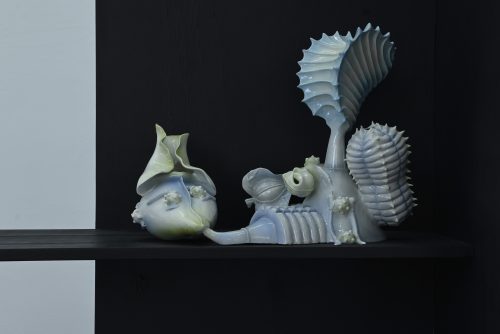
Shani Leseman
In Between Worlds

Untitled glass work, mural
Advertisement

Glass installation, mural

Installation overview

Warned by a Moth

Warned by a Moth

Meeting Etna, video installation

Lily Pond, monotype with earth pigments on silk woven cotton, 160 x 120 cm

A Time Spell, oil paint, acrylics, charcoal, pastel on canvas, 160 x 120 cm

The Animals and their Witch, monotype with earth pigments on silk woven cotton, 160 x 120 cm

gravity, heat, magnetic field, energy, oil paint, charcoal, oil pastel on canvas, 160 x 120 cm

one winged angel, kiln casted glass

a talisman for direction, kiln casted glass

woman holding a veil, kiln casted glass
installation overview
installation overview
installation overview
installation overview
installation overview
Magic is everywhere for artist Shani Leseman: in our
dreams, our experiences, and the world around us. In the
exhibition In Between Worlds, she invites visitors to experience
how painting can serve as a bridge between daily reality and
the dream world. The exhibition at 38CC is her first solo
presentation and it brings together new and earlier works.
In addition to paintings, Leseman also presents monotypes,
ceramics, glass objects, videos, and wall paintings.
Talismagic
In her work, Leseman explores the role of magic
and the supernatural in everyday life. Her
practice is deeply influenced by brua, a spiritual
tradition from the Antillean culture in which
she grew up. This way of magical thinking forms
an essential foundation for her work. This is
also the case in her series Talismagic, [1] which
consists of 100 ceramic talismans. They are
based on milagros: small metal figures used to
express gratitude or to request protection.
Each talisman in the series has its own function:
for example, to ward off gossip, to ensure a
stable income, or to preserve memories.
Reflections on Some
of My Latest Dreams
Dreams play a central role in Leseman’s work.
Sometimes quite literally, when she envisions the
color, form, or title of a new painting in a dream.
Other works are more reflective: Leseman uses
them as a way to grasp and process her dreams
through drawing and painting. For years, she
has kept a dream diary, which she analyzes
through the lens of philosopher Marie-Louise
von Franz, a former student of Jung, who viewed
dreams as messages from the unconscious. In
Reflections on some of my latest dreams [2] (2025),
Leseman combines image and text in a book of
monotypes on cotton silk, where personal and
universal stories intertwine. The text in the book
arises from an exercise in automatic writing, in
which word associations help to explore what lies
hidden in the subconscious.
Floating
Leseman’s paintings flow, breathe, and speak;
just like the world they emerge from. She listens
to her works and lets them guide her, often
leading the painting to take an unexpected direc-
tion. Floating was born from such a dialogue
between artist and canvas. Initially dominated
by earthy tones, the painting appeared in a vivid
blue in one of her dreams, a sign she followed
in the studio. She used handmade paint made
from Reckitt’s Blue, a bluing agent traditionally
used in Curaçao for protection against jealousy,
curses, and misfortune.
She’s So Lucky
She’s a Star
Leseman makes her own paints from earth pig-
ments that she has found, bought, or received.
Some sources are known, such as soil from
Kassel or nettle from the garden near her studio,
while others remain more mysterious. Unlike
synthetic materials, these inks stay alive; once
applied to canvas or wall, their colors continue
to shift under the influence of sunlight and
each other, becoming deeper or more fleeting
over time.
Although she works with traditional mate-
rials, Leseman’s paintings are firmly connected
to present time. Born around the turn of the
millennium, her earthly paintings occasionally
carry a touch of Y2K aesthetics. For example,
in the subtle use of metallic paint from the dis-
count store Action, or in the title of a Britney
Spears pop song.
Monotypes
Over the past year Leseman has created a
series of monotypes, a technique in which she
presses a painted glass plate onto fabric. It is
an unpredictable process where material and
method strongly influence the outcome. The
image is mirrored, parts of the paint remain
behind, and layers blend in a new order. It is
similar to opening a ceramic kiln: each result is
a surprise. The monotypes offer Leseman a new
way to give tangible form to the layered nature
of fleeting experiences: the moment of print-
ing becomes a threshold where the temporary
image takes on a lasting form.
Women, animals, spirits
Leseman’s works are inhabited by female arche-
types, animals, and spirits. In her recent mono-
type series, women appear as witches, angels,
and fortune tellers. Animals act as messengers
and spiritual guides; for instance, she created
See You When I See You in memory of her late
dog Logan. In The Animals and their Witch,
she turns her focus to the relationship between
humans and other animals, whom she regards
as individuals deserving of full and meaningful
lives. Recently, she has also drawn inspiration
from nineteenth-century spirit photography, as
well as images of auras and other paranormal
phenomena.
Meeting Etna
Through video as well, Leseman explores how
to form connections with her surroundings.
Meeting Etna documents her encounter with
Mount Etna in Sicily. The video interweaves
image, text, and painting into a visual diary por-
traying the volcano as a living being. Together
with artist Trees Heil, Leseman poses questions
to Etna and receives answers through their
dreams. For Leseman visiting Etna is as much
a part of her artistic practice as painting itself:
both are ritual acts through which she seeks
meaningful connection with another entity.
Jip Hinten




